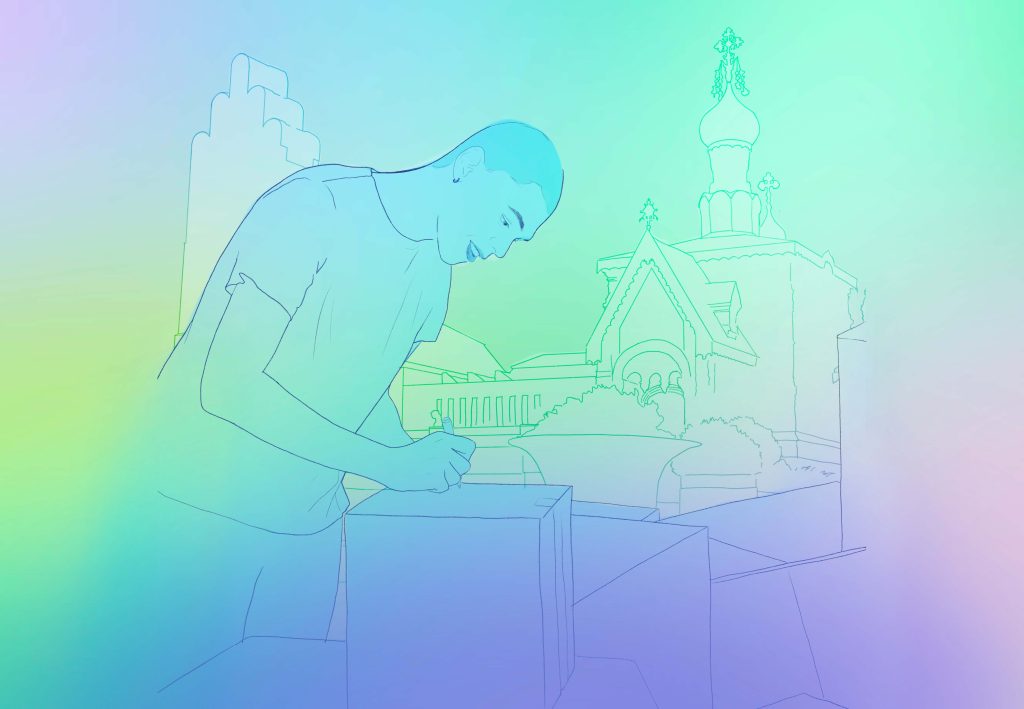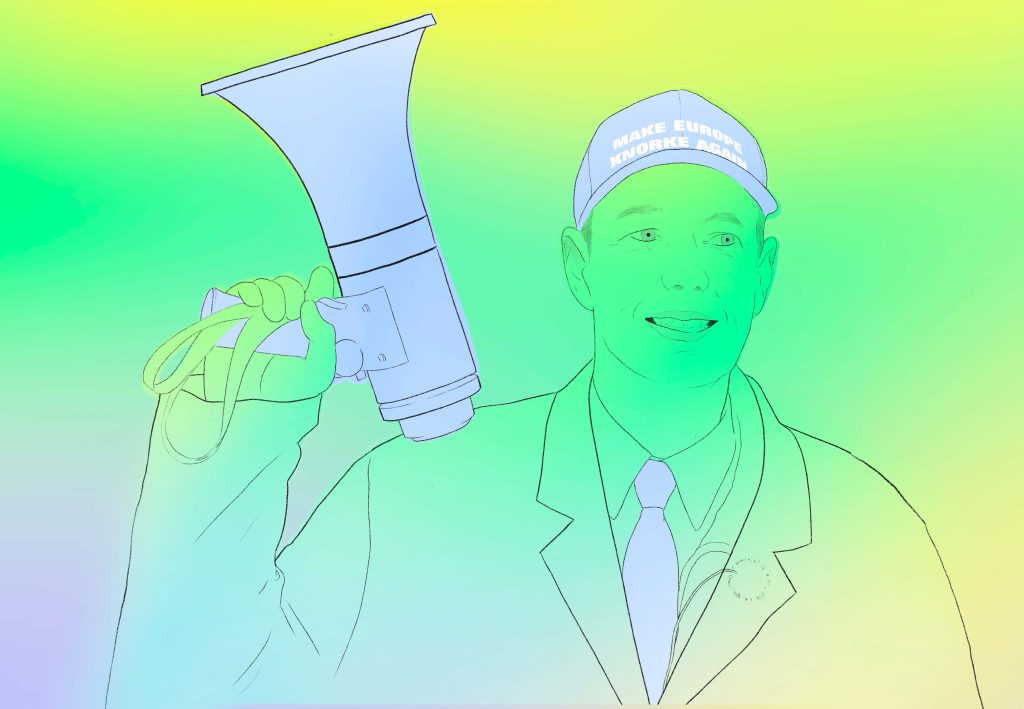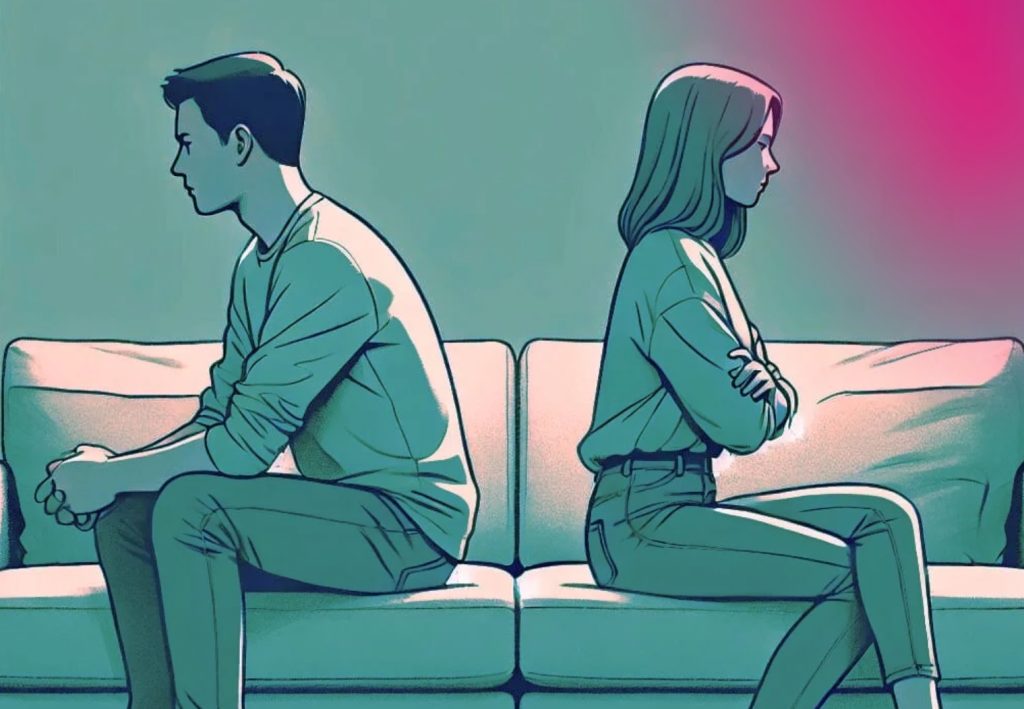Gitarre spielt sich doch im Schlaf – vom Schlafwandeln und wie es aufhörte
Maya-Katharina Schulz (24.01.2024)
Somnambulismus. Ein schwieriges Wort für ein bis heute nicht ganz erklärtes Phänomen: Schlafwandeln. Erst im Sommer letzten Jahres ging ein Fall durch die Schlagzeilen, bei dem ein 45-Jähriger im Schlaf aus dem Fenster dreieinhalb Meter tief auf die Terrasse stürzte und sich dabei schwer verletzte. Schuld war das Schlafwandeln. Ein Zustand irgendwo zwischen halb schlafend und halb wach. Bei Kindern tritt das Phänomen relativ häufig auf, bei Erwachsenen eher seltener (Quelle: Br.de). Beim Träumen sind bis auf den Augenmuskeln alle Muskeln im Körper gelähmt. Dadurch wird verhindert, dass der Körper Bewegungen, von denen wir träumen, in der Realität ausführt. In der Tiefschlafphase sind die Muskeln allerdings nicht gelähmt. In dieser Phase ist es also möglich, aufzustehen und zu schlafwandeln. (Quelle: Swr.de)
Kathi (27) fängt mit etwa fünf Jahren zu schlafwandeln an. Das nächtliche Phänomen begleitet sie viele Jahre, bis sie 19 ist und auszieht. Wie sie das Schlafwandeln erlebt hat und was währenddessen alles so Absurdes passieren kann, hat sie im Ach_dasta-Gespräch berichtet.
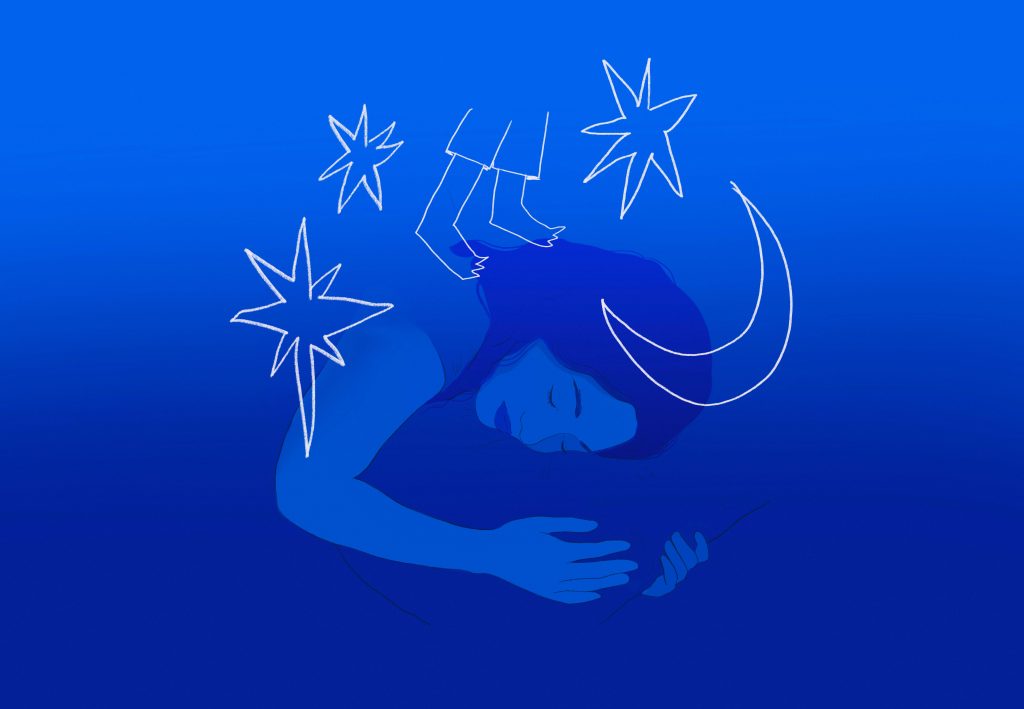
Illustration: Margo Sibel Koneberg
Wie häufig bist du geschlafwandelt? Ist das tatsächlich jede Nacht passiert, oder eher phasenweise?
Das war ganz unterschiedlich. Also auch je nach Lebensphase. So etwa in der zehnten Klasse habe ich mindestens einmal im Monat bewusst geschlafwandelt. Ich habe damals auch versucht, das an irgendetwas festzumachen, und weirder Weise war das häufig genau einen Tag vor Vollmond. Keine Ahnung, ob da wirklich was dran ist, dass da ein Zusammenhang besteht. Und dann gab es auch eine Zeit während der Oberstufe, in der ich so einmal die Woche geschlafwandelt bin. Als Kind war es glaube ich relativ selten, vielleicht einmal alle halbe Jahr oder sowas. Es gibt ja verschiedene Theorien für die Hintergründe des Schlafwandelns. Ein Grund kann das Erleben von psychischem Stress sein. Das macht auch Sinn, in der zehnten Klasse und Oberstufe war natürlich schon Druck da durch die Schule. Aber dass es dann mit dem Studium aufhörte, wo mein Stress jetzt nicht gerade weniger war, macht dann wiederum keinen Sinn!
Du sagst „bewusst geschlafwandelt“ – gab es also schon den Unterschied, dass du es manchmal selbst währenddessen gemerkt hast und manchmal nicht?
Ja, also je älter ich wurde, desto eher habe ich es selbst auch gemerkt. Als Kind hab ich das nie mitbekommen, dass ich geschlafwandelt bin. Das habe ich dann immer erst am nächsten Morgen von meinen Eltern erfahren. Und als Teenie bin ich meistens irgendwann während des Schlafwandelns selbst aufgewacht. Oft bin ich also aufgestanden, bin in meinem Zimmer rumgelaufen und habe irgendwas gemacht. Und wenn ich dann aufgewacht bin, stand ich einfach mitten in diesem dunklen Raum und dachte mir „nicht schon wieder“.
Hattest du Erinnerungen an das, was du während des Schlafwandelns gemacht hast?
Tatsächlich nicht. Also, in meiner Wahrnehmung habe ich wirklich einfach geschlafen. Vielleicht habe ich dabei noch was geträumt oder so. Das weiß ich nicht mehr.
Waren denn deine Träume und das Schlafwandeln irgendwie verknüpft?
Ich bin als Kind oft am Wohnzimmer, in dem meine Eltern abends noch saßen, vorbeigeschlafwandelt. Das heißt, sie haben mich auch oft gesehen, wie ich da vorbeigelaufen bin. Manchmal habe ich auch ins Wohnzimmer reingeguckt – obwohl ich dabei eigentlich noch geschlafen habe. Ich erinnere mich an eine Situation, da hab ich eine Unterhaltung geträumt, die meine Eltern geführt haben. Als ich aufwachte, habe ich gecheckt: Ich stehe neben dem Wohnzimmer und das war gerade die Unterhaltung meiner Eltern im Wohnzimmer. Also da hat dann Traum und Schlafwandeln insofern ineinander gegriffen, als dass ich den Input aus der Realität beim Schlafwandeln in meinen Traum mit eingebaut habe.
Mondsucht
Häufig sprechen Menschen von „mondsüchtig“, wenn es ums Schlafwandeln geht. Das kommt daher, dass sich Schlafwandler:innen oft an einer Lichtquelle orientieren. Früher war das also meist der Mond, heutzutage kann das Licht auch von einer Straßenlaterne oder von einer brennenden Lampe stammen. (Quelle: ardalpha.de)
Was war das Absurdeste, was du während des Schlafwandelns getan hast?
Gitarre spielen.
WAS?!
Ich fand es als Teenie immer uncool, auf meinem Stuhl Gitarre zu spielen und habe mich dazu gerne einfach auf den Boden gesetzt. Einmal bin ich nachts aufgewacht von dem Ton der Gitarre, weil ich eben genau das beim Schlafwandeln getan habe: Auf dem Boden sitzen und Gitarre spielen. Ich habe tatsächlich auch einen richtigen Akkord gegriffen. Und als ich aufgewacht bin, dachte ich nur: „Boah, ist das jetzt wirklich mein Ernst hier?“ Das ist so seltsam, denn eigentlich bin ich total geräuschempfindlich, wenn ich schlafe. Beim Schlafwandeln aber anscheinend nicht!
Stimmt es, dass man jemanden beim Schlafwandeln nicht wecken soll?
Beim Schlafwandeln geweckt zu werden, ist tatsächlich total unangenehm. Jedes Mal, wenn ich als Teenie in meinem dunklen Zimmer stand, war das so. Da war ich die ersten Male total desorientiert, weil halt wirklich kein Licht da war. Mir war dann gar nicht klar: Träume ich, oder bin ich wach? Da habe ich oft wirklich Angst bekommen und musste mir dann selbst über die Hände und Arme streichen, um zu merken, dass ich wirklich wach bin, und dass es einfach nur dunkel ist. Dann habe ich gecheckt: Okay, ich bin in meinem Zimmer und ich kann jetzt Anhaltspunkte suchen, um den Lichtschalter zu finden. Und irgendwann kannte ich das dann schon und war in solchen Situationen dann einfach nur noch genervt darüber, dass ich da schon wieder mitten in meinem dunklen Zimmer stand. Irgendwann habe ich mir dann auch ein Mini-Licht irgendwo angemacht, damit ich mich nachts daran orientieren konnte.
Hast du unter dem Schlafwandeln gelitten?
Als Kind nicht so sehr. Da habe ich ja auch kaum was davon mitbekommen. Nur selten war es alltagsbeeinträchtigend. Ich erinnere mich daran, dass meine Eltern abends immer mit mir abgesprochen haben, wie ich am nächsten Tag zur Schule kommen würde – entweder mit dem Schulbus oder mit dem Vater von Freunden, der uns alle mit dem Auto mitnahm. Ein paar Mal ist es passiert, dass ich abends am Wohnzimmer vorbeigeschlafwandelt bin und meine Eltern gesagt haben: „Ah, Kathi, du bist noch wach! Ich wollte dir Bescheid sagen: Du musst morgen mit dem Bus fahren, du musst früher aufstehen.“ Dann wirkte ich wohl so, als wäre ich wach, aber eigentlich habe ich geschlafen. Und dann hab ich am nächsten Morgen den Bus verpasst. Das war schon doof einfach…
Und als Teenie war es halt einfach nervig, nachts in dem dunklen Raum wach zu werden. Da hab ich manchmal wirklich eine halbe Stunde diesen Lichtschalter gesucht und mich auch mal einfach auf den Boden gelegt und versucht, irgendeinen Anhaltspunkt dafür zu finden, wo ich bin. So lost und desorientiert war ich in diesem Zimmer. Dann war ich morgens natürlich schon müde. Aber ich würde nicht sagen, dass es mich krass belastet hat, weil ich es relativ normal immer fand, dadurch dass ich es ja von klein auf kannte. Ich war immer relativ gelassen damit.
Das heißt, du warst während all dieser Jahre nie bei einer Schlafberatung oder in einem Schlaflabor, um deinem Schlafwandeln auf den Grund zu gehen?
Nee. Ich habe irgendwann mal eine Reportage darüber gesehen, wie man Schlafwandeln therapieren kann. Und dass man dann jemanden über mehrere Wochen im Schlaf leicht ans Bett bindet oder so. Das wollte ich aber nie, habe es einfach nie als nötig angesehen, weil ich immer dachte, dass das ja voll normal ist.
Hat dich das Schlafwandeln mal in Gefahr gebracht?
In meiner Kindheit haben wir im ersten Obergeschoss gewohnt und dementsprechend gab es eine Treppe. Meine Eltern hatten immer Angst, dass ich nachts da runter schlafwandle – was tatsächlich auch relativ oft passiert ist. Sie mussten mich also regelmäßig davon abhalten, die Treppe runterzugehen, weil ich nachts häufig einfach Schuhe und Jacke angezogen habe und rausgehen wollte. Schon ein bisschen creepy von außen betrachtet. Und wenn meine Eltern mich dann nicht zurück ins Bett geführt hätten, wäre ich bestimmt mal nachts auf der Straße aufgewacht. Wir haben auf dem Dorf gewohnt, ich weiß nicht, was da jetzt passiert wäre. Wahrscheinlich wäre ich wach geworden, hätte Angst gehabt und wäre desorientiert gewesen. Aber dazu ist es nie gekommen.
Mit deinem Auszug hat das Schlafwandeln ja relativ abrupt aufgehört. Hast du eine Erklärung dafür?
Das weiß ich nicht genau. Ich erinnere mich noch, dass ich, als ich dann in meine Studienstadt gezogen bin, am Anfang etwas Bedenken hatte, dass ich in der WG schlafwandeln könnte. Das wäre mir schon unangenehm gewesen. Ob das je passiert ist, kann ich nicht sagen – vielleicht schon und es ist mir nicht aufgefallen? Erinnern kann ich mich aber nicht mehr. Irgendwann habe ich auch angefangen, mit offenen Rollläden zu schlafen, um das Desorientiert-Sein beim Aufwachen zu verhindern. Aber ich glaube der ganze Umzug war einfach so ein Reset und mein Körper war mit so vielen anderen Dingen beschäftigt.
Alkohol?
Vielleicht auch das? Aber ich glaube, zum größten Teil war es einfach der Kontextwechsel, der dafür gesorgt hat, dass das Schlafwandeln aufhörte. Und heute ist gar nichts mehr davon übrig. Ich spreche auch nicht im Schlaf, zumindest habe ich das bisher noch nicht so rückgemeldet bekommen…
English version (automated translation):
Playing guitar in your sleep – about sleepwalking and how it stopped
by Maya-Katharina Schulz (24.01.2024)
Somnambulism. A difficult word for a phenomenon that is still not fully explained: sleepwalking. Just last summer, a case made the headlines in which a 45-year-old man fell three and a half meters out of a window onto a terrace in his sleep, seriously injuring himself. Sleepwalking was to blame. A state somewhere between half asleep and half awake. The phenomenon occurs relatively frequently in children, but less frequently in adults (source: Br.de). When dreaming, all muscles in the body are paralyzed except for the eye muscles. This prevents the body from carrying out the movements we dream about in reality. In the deep sleep phase, however, the muscles are not paralyzed. In this phase, it is therefore possible to get up and sleepwalk. (Source: Swr.de)
Kathi (27) started sleepwalking when she was around five years old. The nocturnal phenomenon accompanied her for many years until she was 19 and moved out. In the Ach_dasta interview, she talks about how she experienced sleepwalking and all the absurd things that can happen during it.
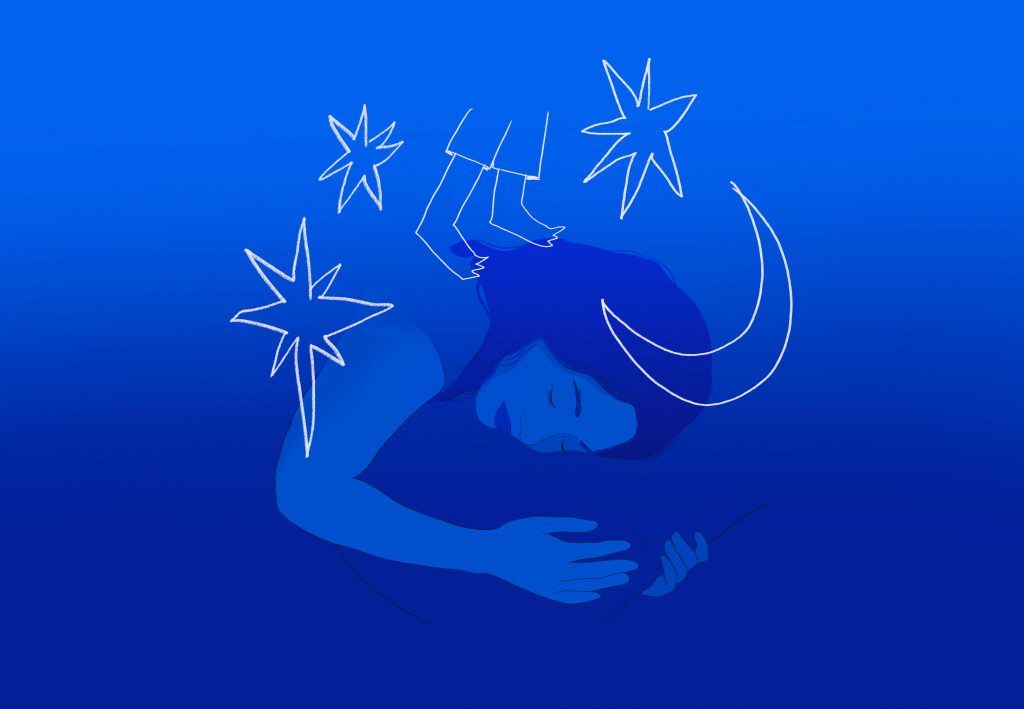
Illustration: Margo Sibel Koneberg
How often did you sleepwalk? Did it actually happen every night, or was it more in phases?
It varied, especially depending on the phase of life I was in. For example, around tenth grade, I sleepwalked at least once a month consciously. At that time, I also tried to pinpoint a cause, and weirdly, it often happened exactly one day before a full moon. I don’t know if there’s really any truth to the idea that there’s a connection there. And then there was a time during my upper school years when I sleepwalked about once a week. As a child, I think it was quite rare, maybe once every six months or so. There are various theories about the reasons behind sleepwalking. One reason can be experiencing psychological stress. That makes sense, as there was certainly pressure from school during tenth grade and upper school. But the fact that it stopped during university, where my stress wasn’t exactly less, then doesn’t make sense!
You say “consciously sleepwalked” – so there was a difference that sometimes you noticed it while it was happening and sometimes not?
Yes, the older I got, the more I noticed it myself. As a child, I never realized that I was sleepwalking. I always found out the next morning from my parents. And as a teenager, I usually woke up at some point while sleepwalking. Often, I would get up, walk around my room, and do something. And when I woke up, I just stood in the middle of this dark room and thought, „not again“.
Did you have any memories of what you did while sleepwalking?
Actually, no. In my perception, I really just slept. Maybe I dreamed something during that time, but I don’t remember.
Were your dreams and sleepwalking somehow linked?
As a child, I often sleepwalked past the living room where my parents sat in the evenings. So, they often saw me walking past. Sometimes I even looked into the living room – although I was actually still asleep. I remember one situation where I dreamed of a conversation my parents were having. When I woke up, I realized: I’m standing next to the living room, and that was exactly the conversation my parents were having in the living room. So there, the dream and sleepwalking intertwined in that I incorporated input from reality into my dream while sleepwalking.
Lunatism
Some People often speak of being „lunatism“ in relation to sleepwalking. This stems from the fact that sleepwalkers frequently orient themselves using a light source. In the past, this was usually the moon, but nowadays, the light can also come from a streetlamp or a burning lamp. (Source: ardalpha.de)
What was the most absurd thing you did while sleepwalking?
Playing guitar.
WHAT?!
As a teenager, I always found it uncool to play guitar sitting on a chair, so I liked to sit on the floor. Once, I woke up to the sound of the guitar because that’s exactly what I did while sleepwalking: sitting on the floor and playing the guitar. I even managed to hold a proper chord. When I woke up, I just thought, „Really, is this happening?“ It’s so strange because normally I’m very sensitive to noise when I sleep. But apparently not while sleepwalking!
Is it true that you shouldn’t wake someone who is sleepwalking?
Being woken up while sleepwalking is indeed very unpleasant. Every time I stood in my dark room as a teenager, it was like that. The first few times I was totally disoriented because there was really no light. I wasn’t sure: Am I dreaming, or am I awake? That often really scared me, and I had to stroke my hands and arms to realize that I was really awake, and it was just dark. Then I realized: Okay, I’m in my room and I can look for reference points to find the light switch. Eventually, I got used to it and was just annoyed that I was standing in my dark room again. I even started to leave a mini-light on somewhere so I could orient myself at night.
Did you suffer from sleepwalking?
As a child, not so much. Since I hardly noticed it, it was rarely impairing my daily life. I remember my parents always discussed with me in the evening how I would get to school the next day – either by school bus or with a friend’s father who took us all by car. A few times, I sleepwalked past the living room in the evening and my parents said, „Ah, Kathi, you’re still awake! I wanted to let you know: You have to take the bus tomorrow, you need to get up earlier.“ Then I appeared as if I was awake, but I was actually asleep. And then the next morning, I missed the bus. That was quite annoying…
And as a teenager, it was just annoying to wake up in the dark room. Sometimes I really searched for the light switch for half an hour and even lay on the floor trying to find some point of reference to figure out where I was. I was so lost and disoriented in that room. Then I was naturally tired in the morning. But I wouldn’t say it was a huge burden because I always found it relatively normal, having known it from a young age. I was always quite relaxed about it.
So, during all these years, you never went to a sleep consultation or a sleep lab to get to the bottom of your sleepwalking?
No. I once saw a documentary about how sleepwalking can be treated. And that one can be lightly tied to the bed for several weeks during sleep as a therapy. But I never wanted that, I never saw it as necessary, because I always thought it was completely normal.
Did sleepwalking ever put you in danger?
In my childhood, we lived on the first floor, so there was a staircase. My parents were always afraid that I would sleepwalk down the stairs at night – which actually happened quite often. So they regularly had to prevent me from going down the stairs, as I often just put on shoes and a jacket at night and wanted to go outside. A bit creepy from the outside perspective. And if my parents hadn’t led me back to bed, I probably would have woken up on the street at night. We lived in a village, I don’t know what would have happened then. Probably I would have woken up, been scared, and disoriented. But that never happened.
With your move out, the sleepwalking stopped quite abruptly. Do you have an explanation for that?
I’m not sure. I remember that when I moved to my university town, I was initially a bit worried that I might sleepwalk in the shared apartment. That would have been embarrassing. Whether it ever happened, I can’t say – maybe it did and I didn’t notice? But I can’t remember anymore. At some point, I also started sleeping with open blinds to prevent disorientation when waking up. But I think the whole move was just such a reset, and my body was busy with so many other things.
Alcohol?
Maybe that too? But I think, for the most part, it was just the change of context that caused the sleepwalking to stop. And today, there’s nothing left of it. I also don’t talk in my sleep, at least I haven’t been told so…
- Darmstadt: Studentisch, klein und heimisch – Ein ErfahrungsberichtDarmstadt: Studentisch, klein und heimisch – Ein Erfahrungsbericht von Pauline Dörrich (24.07.2024) Zum Studienstart gehört bei vielen angehenden Studierenden ein Ortswechsel dazu. Raus aus Hotel Mama und der bekannten Umgebung, rein in die eigenen vier Wände und in eine neue Stadt. So auch für den 21-jährigen Justus Kress aus Düsseldorf. Pauline Dörrich hat für ach_dasta… Weiterlesen »Darmstadt: Studentisch, klein und heimisch – Ein Erfahrungsbericht
- „Ich möchte den tödlichen Witz entwickeln!“Elias Mantwill und Linus Moerschel haben mit Martin Sonneborn darüber gesprochen, was für ihn Satire bedeutet, welche Grenzen diese hat und wie er Satire in der Politik verwenden möchte.
- „Da hätte ich schon rennen sollen“ – Marie über ihre toxische BeziehungMarie ist 21 Jahre alt. Vor fünf Jahren war sie in einer toxischen Beziehung gefangen, Mitte 2021 trennte sie sich von ihrem Ex-Freund. Im Gespräch mit ach_dasta! berichtet sie über ihre Erfahrungen.

